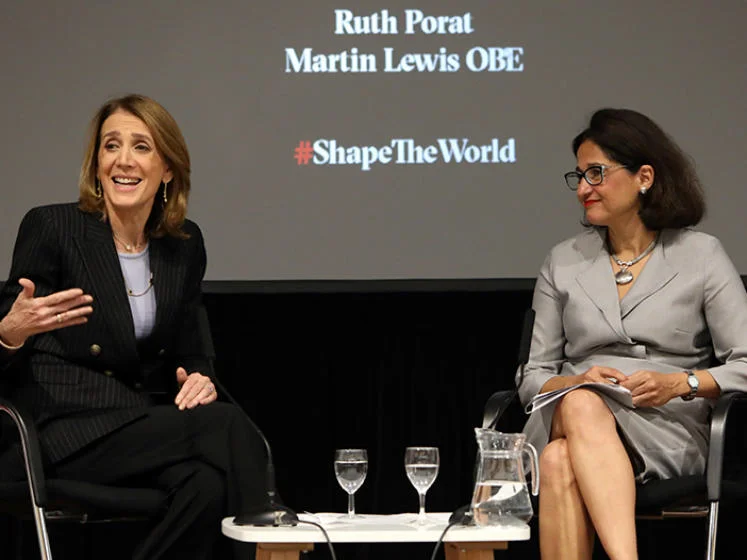LSE 2030 strategy launch

A new endowment scholarship fund for women students from disadvantaged backgrounds was announced by LSE Director Minouche Shafik at the launch of LSE 2030, the School’s strategy to shape the world.
The fund has been established by Ruth Porat, Senior Vice President and Chief Financial Officer of Alphabet and Google, and her husband Anthony Paduano, who met as students at LSE’s Passfield Hall. Ruth was a special guest at the new strategy launch, along with another LSE alumnus, Martin Lewis, the campaigning journalist and founder of the website MoneySavingExpert.com.
Thanking Ruth and Anthony for their generosity, Minouche said: "This is really a fantastic opportunity to give young women from around the world an opportunity to fulfil their potential."
Explaining LSE’s new 2030 strategy, Minouche told a packed Old Theatre that it emanated from the largest consultation in LSE’s history, with over 1800 submissions from staff, faculty, alumni and students. Its aim is for LSE to become the world’s top social sciences institution for global impact.
"We have recommitted to LSE’s founding purpose which is to be a community of people and ideas founded to know the causes of things for the betterment of society," she explained.
"We are living in a world in which many of the foundations of progress which many of us have enjoyed are being challenged. We see populist politicians who are peddling prejudice, paranoia and false promises. The negative side effects of technology and globalisation are resulting in some people arguing for much more closed societies. Independent institutions like universities, the media and the judiciary are under attack everywhere.
"At best, there is indifference to those who have the knowledge and the skills and the evidence to inform better decisions. At worst, there is outright hostility to experts who are seen as part of a malevolent elite. And that’s a problem for us because universities are basically factories for producing experts. That’s our core business. And this comes at a time when the world faces huge challenges: climate change, rising inequality, threats to democracy and stability. And so the world needs the social sciences now more than ever. And we also need some real thinking about alternatives to create a fairer, healthier and more inclusive society."
The three key pillars of the new strategy are ‘educate for impact’ by equipping students to change the world; ‘research for the world’ by advancing LSE’s influence in shaping the world; and ‘develop LSE for everyone’ by investing in LSE’s community, services and infrastructure.
Asked by Minouche what the biggest challenges and opportunities were in future decades, Ruth Porat explained that sustainability and addressing the digital divide through training were a major focus for Google.
She said: "At Google we’re technology optimists. We believe that technology can be applied to the biggest issues of our day and meaningfully improve the lives for billions. We are similarly focussed on what could be the negative unintended consequences of that technology and are motivated to risk mitigate those so that we really can deliver upsides from technology."
She added: "We match 100 per cent of our energy consumption with renewable energy. We’re the largest corporate purchaser of renewables. Our view is sustainability needs to be built into everything that we do." She explained that Google were using AI to reduce energy consumption by up to 50 per cent in their data centres and that this could be used more widely in manufacturing.
She added that social science and the humanities, not just engineering, were essential in developing AI: "You want that diversity of thought to challenge core underlying assumptions so that as we are thinking about solutions, we can take them to a better place. The role of social scientists’ data insight and the challenge that comes from an interdisciplinary approach is really exciting, so there are a lot of parallels between the way we’re looking at challenges and the way you’re defining it in LSE 2030."
Martin Lewis explained how his time at LSE in the 1990s studying Government and Law was transformative, adding: "Without it I wouldn’t be in the position I’m in." A former LSE Student Union General Secretary, he also discussed the challenges he faced in his campaigns for financial education in schools and for greater recognition of the mental health implications of debt.
For further details of LSE 2030, please go to: